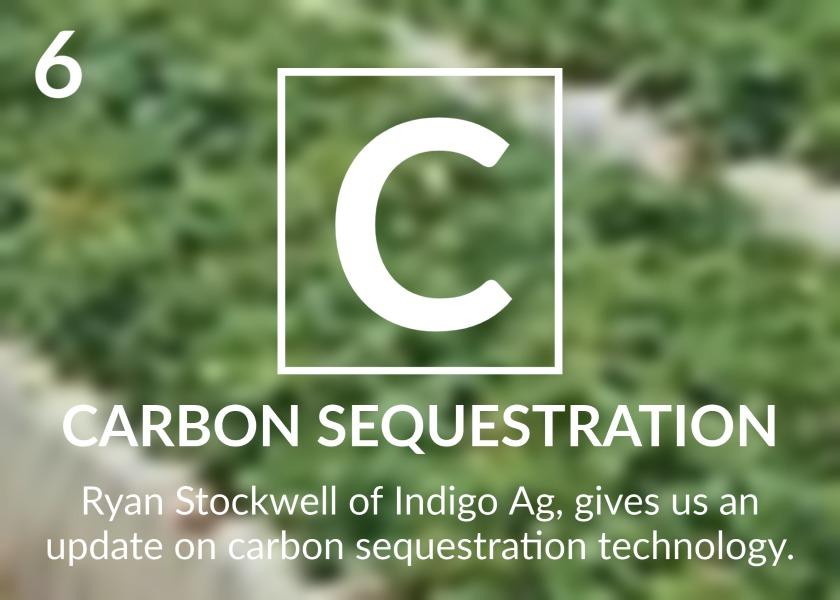AgriTalk: Ryan Stockwell of Indigo Ag on carbon sequestration technology

Chip Flory 0:04
Welcome back to AgriTalk. I'm your host, Chip Flory. Davis Michelson is with us as well. Okay, we we've talked beef and cattle, we've talked ethanol, renewable fuels, it's time talks some carbon. And we've got Ryan Stockwell. He is a senior partner at Indigo Ag, where he is in charge of grower advocacy.
Ryan, welcome to AgriTalk. How are you?
Ryan Stockwell 0:52
I'm doing well. How are you, Jeff?
Chip Flory 0:54
We're doing just fine. Just fine. Hey, you're a farmer up in Wisconsin, too, right?
Ryan Stockwell 0:59
Yeah, that's correct.
Chip Flory 1:00
How's things looking.
Ryan Stockwell 1:01
A little dry in the western and southern portions of the state? The East has been getting a lot of rain, though. So we're, there's a fine line between those two?
Chip Flory 1:13
Yeah, that's right. It is Wisconsin is one of the have have not states this year. No question about it. So what's the status? Where are we in the development of the carbon market?
Ryan Stockwell 1:30
Yeah, carbon market says everybody knows. It's quickly developing and progressing. It seems like every week, there's a new opportunity that comes along. So we wanted to be as helpful as possible. And we're holding a virtual event, June 23, A Carbon Farming Connection and it's an opportunity to just get some questions answered.
Chip Flory 1:56
Okay, Carbon Farming Connection. Got it. When it comes to these carbon markets, Ryan, are our farmers signing up? Are they still just mostly looking for information? What is the level of acceptance?
Ryan Stockwell 2:17
Yeah, I think you'll you'll see that there's a range out there we have, we have a number of farming partners out there who are participating with us and and others that are working with other programs. And they're all in. And that's great to see. And we also have, we know, there are a number of farmers out there who are paying attention and learning and trying to make an informed decision. We know that, you know, adding cover crops or implementing no-till some of these changes, that impacts their operation. And they have to be concerned about that first and foremost. So we want to make sure that they can have success with their operation. So we know that they're they're doing their homework.
Chip Flory 2:59
Yeah, yeah. The regenerative farming practices, it's something that you do on your farm, right. Tell us about that.
Ryan Stockwell 3:08
That's correct. I've been using no-till and cover crops for 10 years now. You know, as as anybody else who's been in, in that moves in that direction, always looking to add more. So I'm looking to add livestock back to the operation. We took the fencing out 25 years ago when I was growing up. And now I want to put it all back in.
Chip Flory 3:31
I think there's a few out there that want to do that. So these practices that you've had in place for 10 years. Is there is is there a carbon market or a program that those acres that have been in regenerative farming practices for a period of time that that they can also participate in?
Ryan Stockwell 3:56
Yeah, you know, certainly if you've been doing cover crops, and no-till for a year or two, there's there are more opportunities. Right? Yeah, the important factor that that the demand side of this market is looking for is a term called additionality. They want to make sure that the carbon credit that they're buying actually caused a change in the net emissions or sequesteration. of of greenhouse gases. So that's an important feature that that we have to keep in mind. Certainly, you know, with my, I'm a good example here. I've been doing some of these practices for 10 years, but there's still things that I can keep adding.
Chip Flory 4:36
Yeah. You know, that's one of the arguments that I make guys like you that have been doing this for 10 years, 15 years, even longer than that. are innovators and innovators don't stop innovating once they've reached a certain level, correct.
Ryan Stockwell 4:52
Oh, yeah, that's, that's right. There's we found in a lot of conversations that yeah, if you're if you've already got covercraft good chances are that you could probably plant a little sooner or terminate a little bit later, or add some diversity to that mix. So just about every time that we get a chance, we find that there's an opportunity.
Chip Flory 5:14
Yeah. What is the farming practice? When we talk about carbon sequestration, the farming practice that newcomers those getting started in the effort, find most acceptable?
Ryan Stockwell 5:33
That's a that's a really complex question. And it has a complex answer. I would say that. It again, it depends on your operation depends on your location and climate. But I would say that the two biggest that are getting a lot of attention are surely switching the full no-till, as well as adding some cover crops. I know, cover crops, a lot of press right now. But both of those have some significant benefits to just about every farming operation out there.
Chip Flory 6:04
Okay, very good. Very good. Another question that I get from growers Ryan and I know that you've heard it, too. They wonder if there is a role for the federal government in developing this market? Is there one?
Ryan Stockwell 6:20
You know, I think it's to be seen yet. It's from early indications from what we've heard from the new administration, that they want to make sure that the private market is viable, and they don't want to interrupt that. So that's certainly a good sign. And they want to make sure that it functions well. So so I think they see their role as facilitating that market for helping to ease that information flow, so that buyers and sellers feel more comfortable.
Chip Flory 6:54
Gotcha, gotcha. Okay, where do we go for more information on the June 23 webinar?
Ryan Stockwell 7:01
So yeah, youcan sign up and register for that event. June 23. event at IndigoAg.com\events
Chip Flory 7:09
backslash events. Good stuff, Ryan, thank you so much.
Ryan Stockwell 7:14
Yeah, thank you, Chip.
Chip Flory 7:15
You bet. That is Ryan Stockwell. He is a senior partner with Indigo ag where he is in charge of grower advocacy.







